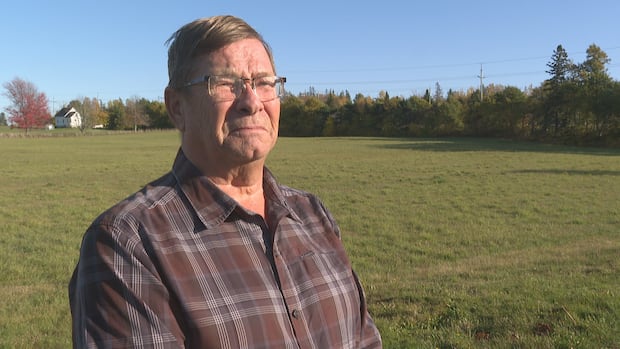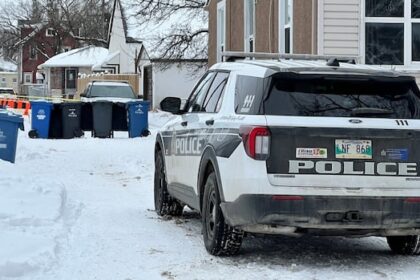PEI·NewSome Islanders are growing concerned about chemicals called PFAS in their drinking water and say the province hasn’t given them answers about when things might get better.High levels of chemicals known as PFAS detected in wells in Hazelbrook and Slemon ParkConnor Lamont · CBC News · Posted: Oct 28, 2025 5:00 AM EDT | Last Updated: 1 hour agoListen to this articleEstimated 5 minutesSome Islanders still can’t drink their tap water due to ‘forever chemicals’ called PFASSome people on P.E.I. are still dealing with high levels of chemicals called PFAS in their drinking water. They say the province hasn’t given them any updates on a solution and they’re growing concerned. Connor Lamont reports. Some Islanders are growing concerned about a class of chemicals known as PFAS in their tap water and said the province hasn’t given them any information about possible solutions to the problem.Per- and polyfluoroalkyl substances — or PFAS — are man-made chemicals used for their water- and heat-resistant properties. They might be found in everyday products like cosmetics and packaging, and in industrial products like fire fighting foam and construction materials.A report from the federal government said exposure to these ‘forever chemicals’ can be harmful to the body, including the liver, kidneys, immune system, reproductive system and nervous system.The community of Hazelbrook is one of many areas across the province impacted by PFAS. The province is supplying bottled water to 10 homes after tests showed high levels of PFAS in well water.”We are quite concerned,” said Hazelbrook resident Doug Jenkins. “That’s something you go to bed at night thinking about and wake up in the morning thinking about. Is this water going to exacerbate any conditions or create new ones? It’s quite stressful.”Jenkins said he uses bottled water for simple things like brushing his teeth, but worries about the impact of coming in contact with the water for other daily activities like showering. Some residents in Slemon Park have received water filters like this one to treat PFAS in the water. Jenkins said Hazelbrook residents have only received water jugs from the province. (Connor Lamont/CBC)Health Canada has set a benchmark of 30 nanograms per litre for 25 specific PFAS in drinking water, but Jenkins said his water tested up to 30 times that limit.What’s making the problem worse is there’s no clear solution in sight. He said the government hasn’t provided any answers about what the short and long-term options are to fix the contaminated water. He said his well hasn’t been tested since February and the province hasn’t responded to letters he sent months ago.”You would think after 10 months somebody would have some direction as to where we’re going,” said Jenkins. Is this water going to exacerbate any conditions or create new ones- Doug Jenkins, Hazelbrook residentAnd he’s not alone, other residents haven’t been given any updates from the province either.”I guess everybody is sort of in a limbo,” said Donnie Gallant, who also hasn’t had his water tested since earlier this year.”I was sort of surprised about that a bit,” he said. “I thought they might re-check it to see if the levels are going up or down or just staying where they are.”Hazelbrook’s next stepsIn April, the province told CBC News that a ‘preliminary review’ showed a construction and demolition site nearby could be the problem. It was decommissioned over a decade ago and the property is now owned by the province. A new statement sent to CBC News Friday from the the department of Environment, Energy and Climate Action said “the province is being proactive in addressing PFAS to safeguard our water and residents.”It goes on to say the province is continuing to provide bottled water to 10 residents in Hazelbrook while the government assesses its next steps. Slemon Park residents using water filters, dispensers Residents in Slemon Park have also been dealing with PFAS levels above the Health Canada objective since they were first alerted of the problem in February. A letter from the Slemon Park Corporation addressed to tenants in September said residents have been given water filters or dispensers, and under-sink filters have been installed in some commercial operations. Some Slemon Park residents told CBC News they are concerned about using the water for things like cooking. Other residents said while they do feel safe drinking the filtered water, if the well water is contaminated, it should be fixed. A resident in Slemon Park tests their tap water for PFAS. (Connor Lamont/CBC)The letter goes on to say that, “an engineering firm has been engaged to investigate options and recommend a long-term solution to bring the Slemon Park water supply in line with the Health Canada PFAS chemical drinking water objective.” The Slemon Park Corporation is hoping to provide an update in October with some details on long- term solutions.The MLA for the area, Hilton MacLennan, said he has heard the concerns from residents about PFAS. He told CBC News he has brought those concerns to officials with the province.PFAS in schoolsThe province has also installed treatment systems to treat FPAS at Ellerslie Elementary School and Vernon River Consolidated School.The province said the system at Vernon River Consolidated “continues to be monitored and results indicate it is operating as designed.”At Ellerslie, the treatment system needed a new filter towards the end of the last school year, so bottled water was provided by the Public Schools Branch. “Over the summer, a new well was constructed. Testing indicates no PFAS present in the new well,” said the province.The PSB has also hired a company to monitor the treatment systems at both schools. P.E.I.’s Chief Public Health Office said Health Canada put in the drinking water objective for PFAS in 2024, “recommending a precautionary approach to minimize potential health risks.”According to Health Canada, using PFAS-containing water for things like bathing, showering, brushing teeth, washing dishes, and doing laundry with is “unlikely to significantly increase health risks, as PFAS are not readily absorbed through the skin or inhaled.”ABOUT THE AUTHORConnor Lamont is a news reporter at CBC Prince Edward Island, based in Charlottetown. He previously worked at CBC News Network in Toronto and is a graduate of Toronto Metropolitan University.
Some Islanders still waiting for fix to stop ‘forever chemicals’ from contaminating their drinking water











